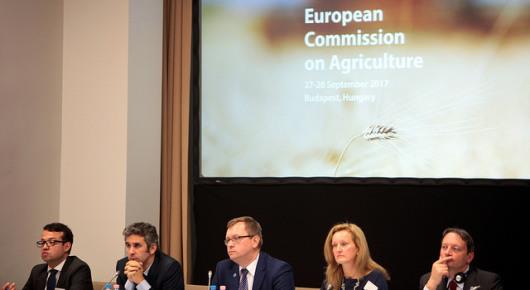Europe, Central Asia ready to address transboundary animal diseases

More than 130 individuals left Budapest over the weekend and returned home to some 40 different countries, after two days of intensive discussions on how climate change is affecting transboundary animal diseases.
The 40th session of the European Commission on Agriculture concluded with the unanimous adoption of the final report.
As an FAO body with no counterpart in other regions, the Commission has become a unique brand that should be used to address priorities of FAO Members, FAO Assistant Director-General and Regional Representative for Europe and Central Asia Vladimir Rakhmanin said in his welcoming address.
The programme consisted mainly of technical sessions to present different aspects of the central theme, and listen to the feedback of government, civil society and farmer association representatives, present in large numbers.
The Commission reviewed transboundary animal disease outbreaks of the last 10 years, such as highly pathogenic avian influenza, bluetongue, African swine fever, peste des petits ruminants, lumpy skin disease and others, that have caused epizootic emergencies in Europe and Central Asia.
They concluded that investment in prevention, biosecurity and control measures, diagnostics and improved surveillance had to be up-scaled, as the resources currently being allocated for these measures are inadequate.
Both experts and farmers noted the importance of awareness raising, education and training on transboundary animal diseases and antimicrobial resistance, another pressing veterinary issue on the rise.
As stated in the report, climate change could accelerate the growth of pathogens and parasites, affect the quantity, seasonality and distribution of vectors, or even lead to diseases entering into new geographic areas. This has an impact on animals, including wildlife, and humans.
To meet this challenge several tools, platforms and interventions were presented and discussed. These included disease prevention measures under the Global Framework for the Progressive Control of Transboundary Animal Diseases (GF-TADs), and the One Health initiative, shepherded jointly by FAO, the World Health Organization (WHO) and the World Organization for Animal Health (OIE).
The Commission recommended the establishment of a regional data mining centre to support development of high-tech disease management applications focused on risk modelling, early warning, early response and provision of contextualized information and knowledge on infectious diseases of animals and humans.
Delegates visited a livestock and meat trading company including a farm tour, and the Hungarian Research Institute for Animal Breeding, Nutrition and Science. In the latter scientists presented their method for in vitro fertilization of pigs as part of epidemic preparedness: this could help reproduce and replenish animals quickly after a possible African swine fever outbreak.
A steady agenda item of the European Commission on Agriculture is gender equality in rural areas. Looking at FAO’s work on this, framed by its regional gender equality strategy, participants agreed that being transparent about gender inequality was of crucial importance. For this and other gender-related aims, data disaggregated by gender is crucial. Participants also supported the notion of developing a similar strategy for the coming years.
Efforts to make the Commission’s session more technical and focused on a single theme were welcomed. For future sessions starting in 2019, participants also suggested expanding participation to include more partners, such as international organizations, research institutes, civil society and the private sector.
Ireland was elected as Chair with the mandate to promote the Commission’s more technical orientation.
2 October 2017, Budapest, Hungary
